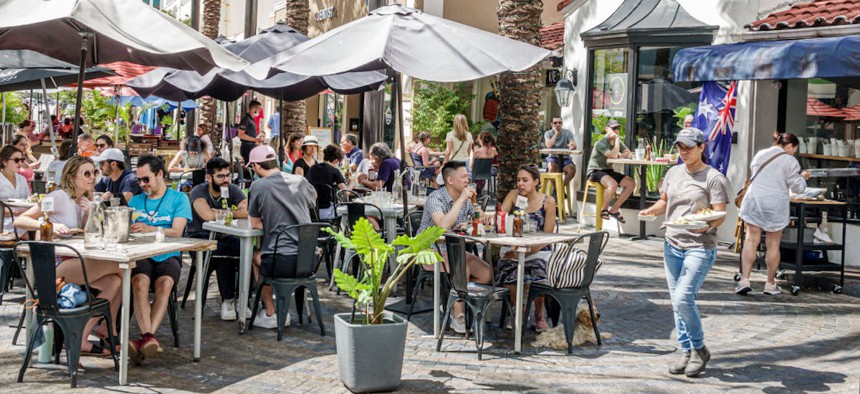Connecting state and local government leaders
Cities are finding ways to attract residents and tourists back downtown, building small business support, community spirit and a local identity.
In their glory days, downtowns were the destination for shoppers heading to luxury department stores, workers grabbing dinner and drinks with a friend or families lining up for the latest blockbuster at the movie theater. From cutesy coffee shops to parks and playgrounds, downtowns were once the heart and soul of a community, as one expert put it.
But in many areas of the U.S. today, “downtowns have become abandoned, neglected and even abused,” said Michelle Kobayashi, principal research strategist at the community engagement and civic analytics company Polco, during a recent webinar hosted by the group and Downtown Colorado, a nonprofit dedicated to downtown revitalization.
The pandemic pushed people from downtown workplaces to their home offices, and as society grew more accustomed to a remote environment, city centers were ditched by residents, restaurant goers, hotel guests, shoppers and tourists. With fewer individuals frequenting downtowns, many cities’ economies have taken a hit.
As the benefits of virtual meetings, order-in dining and online classes have waned, data from Polco’s National Community Survey shows residents are looking to downtowns to once again serve as a public space that can build a sense of community and spur local economic development, Kobayashi said.
Well-developed downtowns are particularly important for older adults who may not have opportunities for daily physical or social activities otherwise, she said. Cities with pedestrian- and bike-friendly infrastructure, for instance, can better lure residents into town centers. Plus, downtowns with affordable housing and job opportunities can attract more workers like recent college graduates.
For local leaders looking to revitalize their downtowns, targeting opportunities to build commercial and social capital is key.
A revitalization project doesn’t necessarily mean tearing up the local main street and rebuilding it with updated facilities. “Downtowns often have some really cool buildings, infrastructure and amenities that are really worth preserving,” Kobayashi said. “We found that [preservation] helps the tourism, but it also really helps if you are able to redevelop those spaces.”
In Florida, the city of Coral Gables’ push to enhance its downtown started in 2016 with a $21 million project to make its main street more walkable and accessible. The project entailed widening sidewalks, removing streetside curbs, installing more green spaces and making parking simpler by adding more valet locations.
Considering 35% to 45% of the city’s property tax revenue comes from commercial areas, ensuring the downtown created opportunities for visitors to engage with businesses was essential, said Belkys Perez, director of the city’s economic development department.
City leaders must also design their communities with inclusivity in mind, said Brian Corrigan, a placemaking strategist who works with city agencies and other stakeholders to improve cultural engagement in communities. They should consider, for example, what kind of spaces and facilities could promote the awareness of historically underrepresented community members.
In Coral Gables, for instance, what used to be the city’s first fire and police station was renovated to become the Coral Gables Museum, Perez said. Since 2011, the publicly funded museum now serves as a cultural center, where visitors can learn about the city’s history and heritage as well as view artwork from local, regional and international artists to foster the appreciation of different cultures. For instance, a current exhibit at the museum features work from Marielle Plasir, a Miami-based artist whose work addresses the social struggle of Black individuals. The center also hosts community events like architectural tours, live performances and biking trips.
Partnering with other agencies and stakeholders was crucial for Coral Gables’ revitalization journey, Perez said. The city’s Chamber of Commerce has helped spur downtown businesses’ engagement in community events, such as hosting wine tastings.
The city also helped support a community holiday decoration contest last year that encouraged businesses on downtown’s main street to decorate their storefronts. Using a QR code placed in store windows, residents voted for their favorite displays. More than 24,000 individuals participated within a three week period, Perez said.
The value small businesses bring to communities should not be underestimated. Residents may prefer buying from novel, local companies over chain corporations “to build community character,” said Brandon Stam, director of downtown development at Grand Junction, Colorado.
Local policymakers should consider how to connect the role of downtowns as innovation hubs to accommodate residents’ increasing desire for more social business experiences. Policymakers could, for instance, support the establishment of public coworking spaces for remote workers who still want the opportunity to spend time with others, Kobayashi said.
“Downtowns have always been the place for innovation … new jobs, new businesses, new ideas,” Kobayashi said. By finding ways to connect residents with businesses to bolster communities, “downtowns can really move forward with the economic boosts they can give to their communities.”

NEXT STORY: Biden administration announces new efforts to boost the nation’s housing supply




